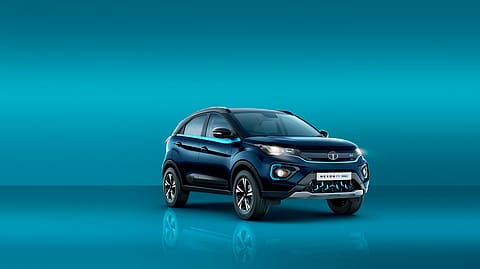Tata Motors rides on Agratas to fulfil EV aspirations
Gujarat gigafactory will ensure 'political de-risking' and control of the whole supply chain, says Tata Motors

Tata Motors is riding on Agratas Energy Storage Solutions, Tata Group's lithium-ion cell manufacturing subsidiary, to achieve its electric vehicle (EV) ambitions.
The conglomerate's proposed gigafactory in Gujarat will ensure 'political de-risking' and control of the whole supply chain upstream as well as downstream, the automaker said in an investor presentation.
Tata Group last week announced plans to set up a lithium-ion cell manufacturing unit in Gujarat with an initial investment of around ₹13,000 crore. Agratas Energy signed a Memorandum of Understanding (MoU) with the Gujarat government to build a gigafactory with production capacity of 20-gigawatt hours.
Tata Motors expects this "aggressive localisation" to drive cost reduction and to benefit from the Production Linked Incentive (PLI) schemes. The automaker is looking to increase localisation of its electric vehicles to 85% over the next 3-4 years. This, according to Tata Motors, will reduce component costs of EVs by around 15%.
With the new gigafactory, Tata Group aspires to be at the forefront of the global battery manufacturing industry. The group's immediate focus is on end-to-end cell design, validation, and, industrialisation, the investor presentation notes.
Agratas ensures localisation of key elements of the supply chain, it says.
Tata Motors plans to leverage Agratas' lithium-ion cell production capabilities to kick-off 'industrialisation at scale'. While Jaguar Land Rover (JLR) requires 40 GWh of cell capaity, Tata Motors needs around 20 GWh.
Recommended Stories
The automaker, which plans to spend over 50% of its capex towards green technologies, reported a 66% year-on-year jump in electric vehicle sales in May. The company sold 5,805 EV units last month compared with 3,505 units in May 2022.
In FY23, Tata Motors sold 50,000 EVs, its highest ever, clocking a growth of 154% over FY22.
According to credit rating agency Moody's, Tata Motors retains an early mover advantage in the battery electric vehicles market in India, with an 85% share for the period April through December 2022. Tata plans to increase its EV lineup from four models to 10, by March 2026. The carmaker's EV business recently raised $1 billion from private equity investor TPG.
Tata Motors says it is driving EV adoption in India with its dominant market share in fleets, long-term agreements with key accounts, including e-mobility market startups such as Uber and BluSmart. In July 2021, Tata Motors tapped the commercial electric vehicle fleet market with the launch of the XPRES brand. In October 2021, it signed an agreement with BluSmart Mobility to supply 3,500 XPRES T EVs. In June 2022, it inked another agreement with BluSmart for 10,000 XPRES T EVs. In February 2021, it signed a deal with ride-hailing app Uber to supply 25,000 XPRES–T EVs.
(INR CR)
Tata Motors is eyeing double-digit earnings before interest, taxes, depreciation, and amortisation (EBITDA) margin in the medium-term. The automaker's net profit stood at ₹5,408 crore for the January-March quarter compared with a loss of ₹1,032 crore in the corresponding period last year. Revenue from operations jumped 35% year-on-year to ₹ 1.05 lakh crore as against ₹78,439 crore in the year-ago period.